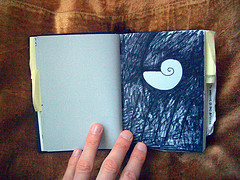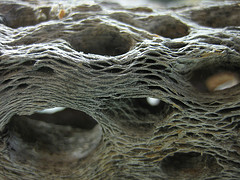 My daily walks are a combination of meditation and exercise. I practice the Alexander Technique, meaning I am acutely aware of how I use my Self. The Self includes the body and mind, the whole package.
My daily walks are a combination of meditation and exercise. I practice the Alexander Technique, meaning I am acutely aware of how I use my Self. The Self includes the body and mind, the whole package.
As I walk, I keep my neck free and flowing up. I remind myself that the neck is a continuation of the spine, not separate from it. I am aware of my 3 dimensionality. I feel my “thickness” and my “width”.
After a few minutes of this awareness and loosening up, I think about my day, or whatever comes to mind. Occasionally a negative thought will arise, or I will dwell on an unresolved issue in my life.
 If I am careful to keep my body free and balanced during these thoughts, I have noticed how much freer my mind is in dealing with them. I prevent my Self from disappearing into the abstraction of thought, where the world becomes something other than where you are now.
If I am careful to keep my body free and balanced during these thoughts, I have noticed how much freer my mind is in dealing with them. I prevent my Self from disappearing into the abstraction of thought, where the world becomes something other than where you are now.
Thoughts can be insidious in this way. Thinking can go on automatically and habitually in the back of the mind. Many of us live with thoughts constantly churning and unbalancing our bodies. Emotions are reactions to thought. Thought always affect the body. It emanates from the body and involves it.
You cannot raise your hand without the whole Self being involved; your entire body and mind are involved. This is not to say that you must focus your entire being on raising your hand. No, but your whole being is a participant. It is the same with thinking.
We also tend to treat thoughts as “real”, as if they are actual events occurring to us at the moment. They feel that way to me if I am not careful. If I think of a dog attacking me, my pulse will quicken with adrenaline. If I think of my debt, my body feels heavy. Those are reactions to thoughts, not the thoughts themselves. If you maintain a balanced, free Self during thought, you can prevent those reactions from occurring without your consent.
So what do I mean by the “porous nature of thought”? If we are aware of staying balanced and 3 dimensionally free throughout the process of thinking, the feeling of thought seems less “heavy” and “solid”. The presence of bodily awareness helps us keep perspective of what thought is: an abstraction of possibility or emotion. Priority is given to the physical self, and a thought is just a passing concept.
Then, thought can pass through us like water through coral, or air through a fan.

I too use the Alexander Technique as a daily practice. Here’s an interesting varient on “let my neck be free”: “I am not tensing my neck” …as I walk, talk etc. Seems counter-intuitive and goes against a lot of linguistic pedagogy, but check it out. Also, check out their wonderful website at http://alexandertechnique.com Includes a lot of info for working on yourself.
Pingback: Oraganic » The Porous Nature of Thought
Pingback: Self Healing
The air of thought includes evaporated emotion (like clouds) and is the key to “formulating” spirit, like radio waves that are perceived as we fine-tune our receptors. The collective consciousness is an ARTifcial intelligence that imposes on natural perfection as understanding, like Fritz Perls said, “Loose your mind and come to your senses.” (Gestalt)
Universal trends permeate prejudices and other definitions as our abilities become more responsive to the air being a shared atmosphere (with wHoly porosity)
Brad- Interesting Perls quote. I often think of falling into the abyss to find my ground. I checked Perls out on Wiki and found his “Gestalt Prayer”. Sums up modern individualism.
I do my thing and you do your thing.
I am not in this world to live up to your expectations,
And you are not in this world to live up to mine.
You are you, and I am I, and if by chance we find each other, it’s beautiful.
If not, it can’t be helped.
I like your idea of thought being a receptor of larger ideas of group consciousness. But as you imply, the problem is prejudice and other inhibitors to a clear “signal”.
Thanks for your always intriguing thoughts.
David
It’s a scientific fact that your nervous system cannot tell the difference between an imagined experience and a “real” experience. There are books written on this subject, many under the heading “psycho-cybernetics” which is a technique for using your subconscious power. Thank you for reminding me of those books which I read a few years ago and benefitted from. There are many paths to the same goal.
Hugs,
Betty
betty- I’m sure you would agree that conscious awareness of one’s present situation can intercept the stimulation of the nervous response. And that lack of same consciousness will allow unnecesssary stimulation by the imagination.
Garnet, I just wanted to let you know this post is now included in Humanist Symposium #13, here:
http://danceswithanxiety.blogspot.com/2008/01/humanist-symposium-13-cheesy-holiday.html
Thanks! – Dale
Great post, Garnet. And thanks Betty for some helpful comments. Noel